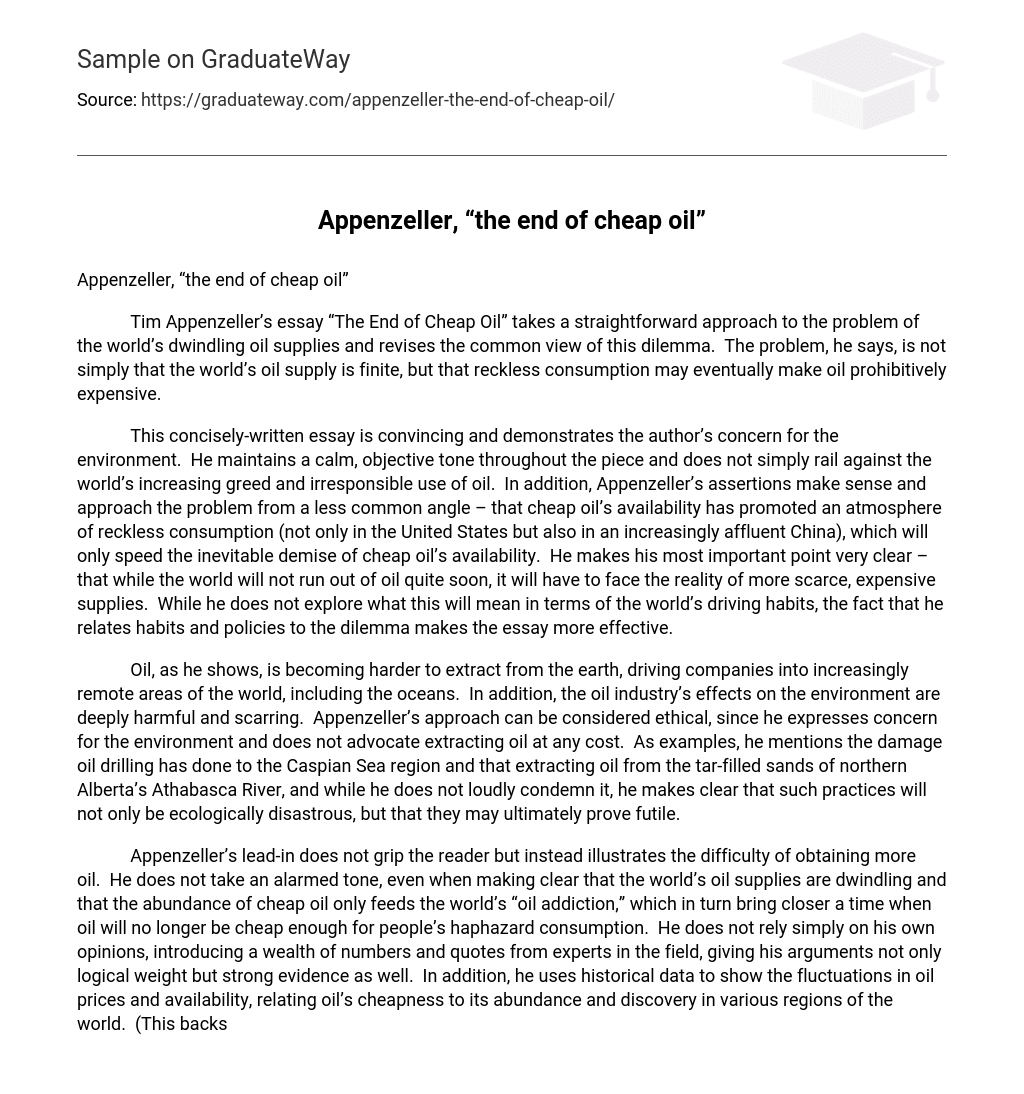Tim Appenzeller’s essay “The End of Cheap Oil” takes a straightforward approach to the problem of the world’s dwindling oil supplies and revises the common view of this dilemma. The problem, he says, is not simply that the world’s oil supply is finite, but that reckless consumption may eventually make oil prohibitively expensive.
This concisely-written essay is convincing and demonstrates the author’s concern for the environment. He maintains a calm, objective tone throughout the piece and does not simply rail against the world’s increasing greed and irresponsible use of oil. In addition, Appenzeller’s assertions make sense and approach the problem from a less common angle – that cheap oil’s availability has promoted an atmosphere of reckless consumption (not only in the United States but also in an increasingly affluent China), which will only speed the inevitable demise of cheap oil’s availability. He makes his most important point very clear – that while the world will not run out of oil quite soon, it will have to face the reality of more scarce, expensive supplies. While he does not explore what this will mean in terms of the world’s driving habits, the fact that he relates habits and policies to the dilemma makes the essay more effective.
Oil, as he shows, is becoming harder to extract from the earth, driving companies into increasingly remote areas of the world, including the oceans. In addition, the oil industry’s effects on the environment are deeply harmful and scarring. Appenzeller’s approach can be considered ethical, since he expresses concern for the environment and does not advocate extracting oil at any cost. As examples, he mentions the damage oil drilling has done to the Caspian Sea region and that extracting oil from the tar-filled sands of northern Alberta’s Athabasca River, and while he does not loudly condemn it, he makes clear that such practices will not only be ecologically disastrous, but that they may ultimately prove futile.
Appenzeller’s lead-in does not grip the reader but instead illustrates the difficulty of obtaining more oil. He does not take an alarmed tone, even when making clear that the world’s oil supplies are dwindling and that the abundance of cheap oil only feeds the world’s “oil addiction,” which in turn bring closer a time when oil will no longer be cheap enough for people’s haphazard consumption. He does not rely simply on his own opinions, introducing a wealth of numbers and quotes from experts in the field, giving his arguments not only logical weight but strong evidence as well. In addition, he uses historical data to show the fluctuations in oil prices and availability, relating oil’s cheapness to its abundance and discovery in various regions of the world. (This backs his claim that oil companies are running out of places to explore, making cheap oil’s demise all the more imminent.)
While the first few paragraphs demonstrate how difficult it is to extract oil from new, increasingly remote places, they lack the immediate impact that would better grab the reader’s attention and would probably work better as supporting evidence in the middle of the piece. The Fort McMurray may better illustrate the difficulties in drawing oil from these new sources, as well as the harsh environmental effects such processes would have. Appenzeller asserts that new drilling techniques are even more damaging to the environment, and using the Fort McMurray example – in which tar sand is mined and the oil extracted through a difficult, wasteful process – would relate better to this claim.
Aside from an introduction that explains but does not grip the reader, Appenzeller’s essay offers a well-detailed, thoughtful examination of the world’s oil dilemma and relies not on sensationalism or alarm, but on facts. More importantly, it asserts the credible idea that while oil may not immediately disappear, cheap oil likely will, and that the world needs to face this imminent reality.





